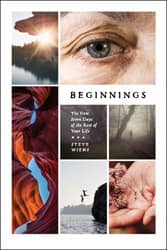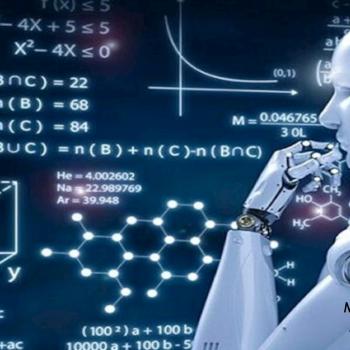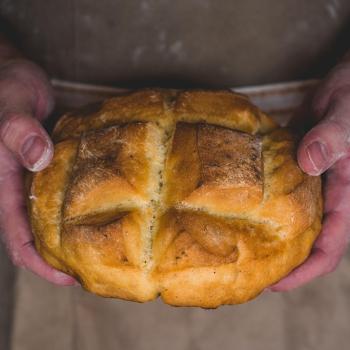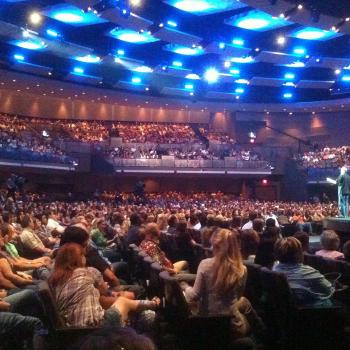Editors' Note: This article is part of the Patheos Book Club on "Beginnings: The First Seven Days of the Rest of Your Life." Learn more about the book here.
I am a pastor. My job is complicated. I do weddings and funerals. I pray with those who are sick. I worry about the church budget. On Sundays, I climb those familiar steps into the pulpit, praying my limited words might seep into broken hearts. I hope I am a small part of making all things new.
But this has been quite a year. And I'm noticing something.
It is whispering around the edges, slowly covering us: a dark fog of fear, choking everything else out. Many of us are running to the extremes and huddling together, faces down, imagining the worst. And who could blame us?
Syrians are fleeing their homes by the thousands. The City of Light was nearly extinguished by terrorists. In San Bernardino, our precious sisters and brothers with disabilities were gunned down. Emmanuel African Methodist Episcopal Church. Eric Garner. Can any of us breathe?
As a pastor, I find myself in the middle of this tension. I feel the pull, even the push, to the extremes, but I find myself unwilling to go there. There just isn't any life there. And there certainly isn't any light.
I'm trying to find a place where I can hear the faintest whisper of hope. Surprisingly, I'm finding it in the darkness.
On the shortest day of the calendar year—the Winter Solstice—many churches open their doors for an evening of lament. We call it the Service of the Longest Night. We gather in the darkness to pray, to listen, to sing, and to wait. No bombastic sermons. No empty promises. The Service of the Longest Night is a time to cry, to say out loud that things are not as they should be. It is a time to pray, to wait for what happens in the dark. Together we light candles, those flickering symbols of hope, and find comfort in the dancing flames, casting both light and shadow.
In the great story of God, darkness always precedes light. The whole story begins in darkness. In the creation poem found at the very beginning, a Hebrew phrase, tohu va vohu, describes a swirling void, a vast nothingness, an inky blackness. And then, light.
When the cries of the children of Israel finally reach the ears of God after suffering in slavery for four hundred endless years, the bright light of a burning bush appears in the dark wilderness to a shepherd who is also a murderer.
When those same children find themselves lost in exile hundreds of years later, a bright star leads the way to a manger, where the Light of the world is born on a dark, holy, silent night.
The reason I'm rejecting the fear found in the extremes is because I know this Story. I know that it always starts in darkness. So I am recklessly and ruthlessly believing that a new chapter is beginning, even in these unholy days and bullet-hole nights.
When the people of God choose to lament in the dark, to weep and wail and light candles, to eschew violence in favor of love, something sacred and generative happens. We emerge from the darkness carrying a light from within which cannot be extinguished. We spread out into our homes and workplaces, into all the dark corners of this tohu va vohu world, and our presence silently stands against fear. We raise our heads, we meet the gazes of our enemies with love and grace, because we understand that they are blind with fear and they do not know what they are doing. And we pray that perfect love really will cast out fear.
 When we light candles in the dark, when we hope and pray and sing and cry, when we are honest about how bad it really is, the God of beginnings meets us. The God of beginnings fills us. And then the God of beginnings sends us out into the dark world, so that new beginnings can erupt out of the ground, bringing hope and life and light.
When we light candles in the dark, when we hope and pray and sing and cry, when we are honest about how bad it really is, the God of beginnings meets us. The God of beginnings fills us. And then the God of beginnings sends us out into the dark world, so that new beginnings can erupt out of the ground, bringing hope and life and light.
I wrote a book called Beginnings; my trumpet blast about how I believe God is still creating, still bringing light to the darkness. I see the seven days of creation not simply as an event in time, but as a process of becoming, which keeps happening, in you and me and the whole world. Because we are not nouns, we are verbs. We are endlessly becoming.
In this, the longest night, let there be light.
12/21/2015 5:00:00 AM




